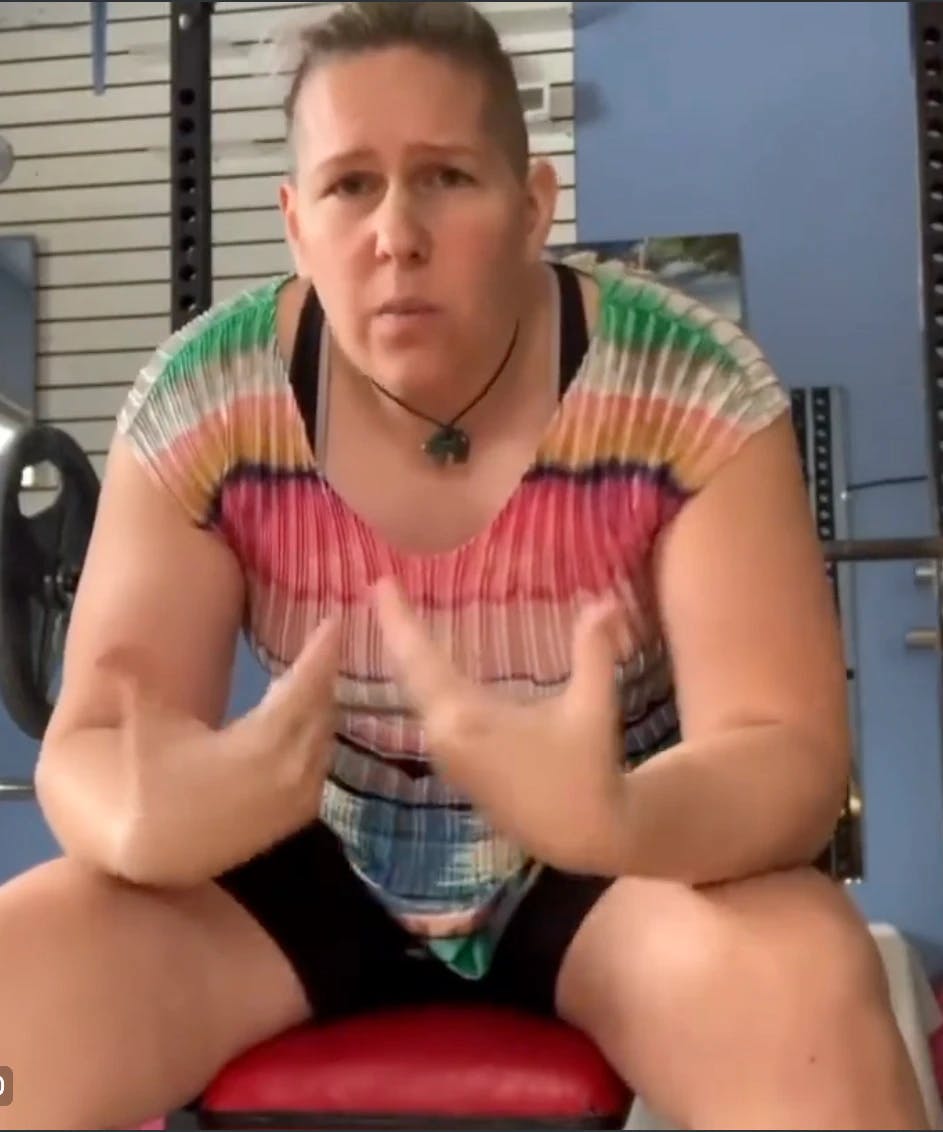Trans-Identified Male Mocks Female Powerlifters For Being "So Bad" After Breaking Another Global Women's Record
He has broken multiple records of women's powerlifting in Canada, and he often claims to be upset that the other female athletes won't fully accept him as if he is one of them.

A male athlete, who identifies as a woman, has broken yet another women’s national record in Canadian powerlifting. Anne Andres, a man who calls himself a trans woman, clinched the first position at the Canadian Powerlifting Union’s 2023 Western Canadian Championship. During the competition, Andres established a new Canadian women's national record and also set an unofficial women's global powerlifting record. This recent achievement marked Andres' 10th win in a total of 12 competitions.
Trans-Identified Male Athlete Mocks Female Powerlifters for Being "So Bad"
Powerlifting competitions determine the winner based on the combined top weights achieved in the squat, bench press, and deadlift. Competing under the Female Masters Unequipped segment, Andres registered a total of 597.5 kg (approximately 1,317 pounds). To provide context, SuJan Gil, who won second place, managed a total of just 387.5 kg (about 854 pounds). This means that Andres surpassed the nearest female competitor by a significant 463 pounds.
After this milestone, Andres took to Instagram, stating that he had secured every masters record, including two unofficial world masters records. Responding to this, Riley Gaines, host of the podcast OutKick’s Gaines For Girls, attributed Andres' superior performance to the increased testosterone levels inherent to males, along with many other biological factors that set Andres apart from women. Despite these achievements, Andres expressed indifference towards records, emphasizing that being with friends at the competition mattered more. He has an odd history of claiming to be concerned with female competitors accepting him as a "trans woman."
On his 40th birthday last week, he took to Instagram and announced that his new age puts him in the Masters 1 category. He said he reached out to as many women as he could who he would now be competing against. "Now I get to be in a whole new category of people that I'm stealing medals from and such," he said. He only got a message back from one woman named Monique. "She's okay with me. That's important. That's really important," he said.
"Not having a great birthday. But some things are making it better. The two strongest women in the world accept me and welcome me to share the platform with them," he wrote in the caption. "I just wish this wasn’t an issue to begin with. That I could simply be strong and that’s the end of the sentence. Maybe 50 years from now."
In another resurfaced video, Andres is seen clearly mocking the women in his powerlifting category and teasing them for not being as strong as he is.
"Why is women's bench so bad?" he said. "I mean, not compared to me. We all know I'm a tranny freak, so that doesn't count."
He went on to make fun of a female powerlifter named Mackenzie and her "little T-rex arms," reiterating that the category of women's bench is just "so bad."
The debate about biological men competing in female sports isn’t limited to powerlifting. Tennis legend Martina Navratilova voiced her concerns, noting the growing instances of men overshadowing women in sports competitions. The ability of Anne Andres to compete in women's competitions stems from a policy shift in February. The Canadian Powerlifting Union declared a gender self-identification policy, which allows men to participate in women's tournaments based on their gender identity, without the necessity for hormonal treatments or medical transition. This decision took its foundation from recommendations by the Canadian Centre for Ethics in Sports.
However, this policy hasn’t been without controversy. Avi Silverberg, a male powerlifting coach, staged a protest against this policy. By "self-identifying" as a woman for a day, Silverberg entered a women’s tournament and broke Andres' bench press record. Yet, Silverberg’s protest failed to bring any policy modifications. Andres criticized Silverberg, alleging “malicious intent” behind his actions, which is rich considering the fact that he is doing exactly the same thing to female athletes.
Andres is just one of several famous male athletes who suddenly decided to become "trans" and break women's athletic records. William Thomas, once ranked 462nd in men's swimming at the University of Pennsylvania, transitioned and became Lia. Joining the women's swim team, Thomas broke records and won awards, leading to a cultural divide. One group viewed Thomas as a victim, not being fully accepted as a "trans woman," while others criticized him for taking opportunities from female athletes. Thomas' online activities, which include questionable content, have sparked allegations of autogynephilia, described as a paraphilic disorder where a male individual has an intense desire to be a woman. Masha Jagasdottir, an expert in childhood development, explained that autogynephilia involves a man mapping his sexual desires onto himself as a female, driven by control. Despite the controversies, Thomas claims to be a victim of transphobia and has criticized feminists who oppose his participation in women's sports.
It's possible that Andres is also suffering from some kind of autogynephilia that results in his finding pleasure in pretending to be a woman, as if that woman is the only one he will truly have full control over. Even if he isn't suffering from autogynephilia, Andres' actions are harmful and detrimental to both individual female athletes and women's powerlifting in general. It's entirely unfair and biologically unreasonable for him to be competing alongside women who don't have the same hormonal and physiological advantages as he has had his whole life.
Support our cause and help women reclaim their femininity by subscribing today.